Coolwire 15
November 2005
Open Letter
read here by Fran Manns, Artesian Geological Research, Toronto
To Dr. Lonnie G.
Thompson
Distinguished University Professor of
Geological Sciences
Ohio State University.
2005 is
unlikely to be Australia's
hottest year.
Says Perth free
lance earth
scientist and Bureau of Meteorology (BoM) critic Warwick Hughes
of;
http://www.warwickhughes.com/
The BoM press
release of 14 November
is headed, "2005: Australia's warmest year on record
?" We note the question mark.
The BoM
conclusion is based on their
specially adjusted data, they choose a start date 1950 which is a
cooler part of the record and they ignore all late 19C data which in
many stations was as warm as recent decades. It seems premature
to make claims about 2005 before the year has ended.
A more
realistic view of the
relative warmth of 2005 placed in century scale perspective is given by
the NASA Goddard Institute for Space Studies (GISS) Surface
Temperature Analysis, Station Data, available at;
http://data.giss.nasa.gov/gistemp/station_data/
GISS is run by
Dr James Hansen, who
I think it is fair to say, has been a "global warming proponent"
since at least 1988. GISS data is built from the USA NOAA
group's global GHCN dataset. Looking at records from the
"homogeneity adjusted" data choice of GISS for all the Australian
capital cities shows that nowhere can the BoM wish come true.
GISS would have adjusted these urban warming affected city stations
taking account of surrounding more rural data. I do not agree
with everything GISS does and I comment below where I think fit.
However NASA / GISS has vastly more experience than the BoM at
evaluating temperature trends from the 19C because their dataset is
global and Dr Hansen and his team have published a series of papers on
global trends over many years.
Let us look at the Australian
examples, city by city, starting in Perth.
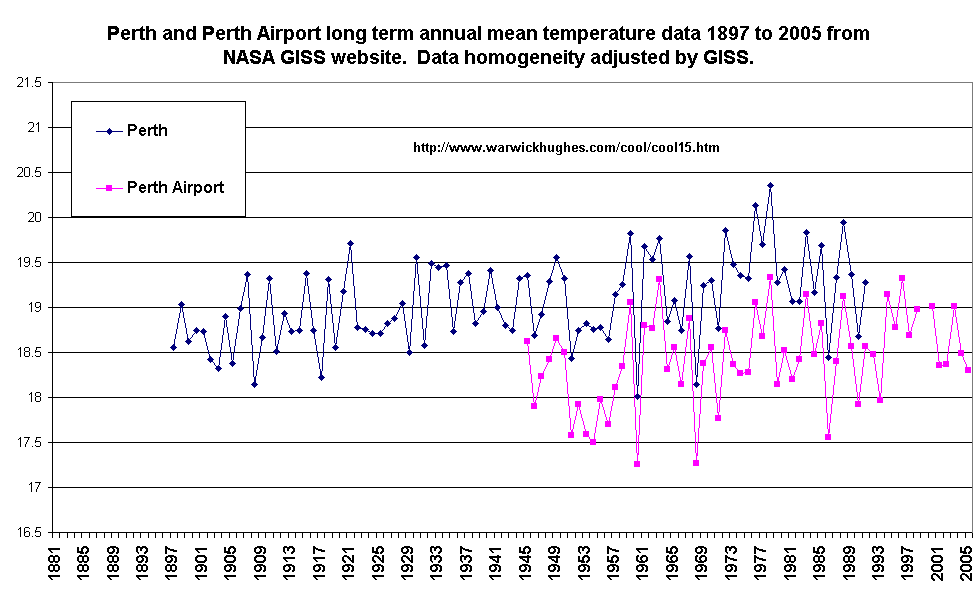
No
possibility in Perth that 2005 will be Australia's warmest year on
record.
I have people from the WA wheat belt
telling me of the worst frost
damage to water pipes this year that they have seen for decades.
Adelaide, Melbourne and East Sale
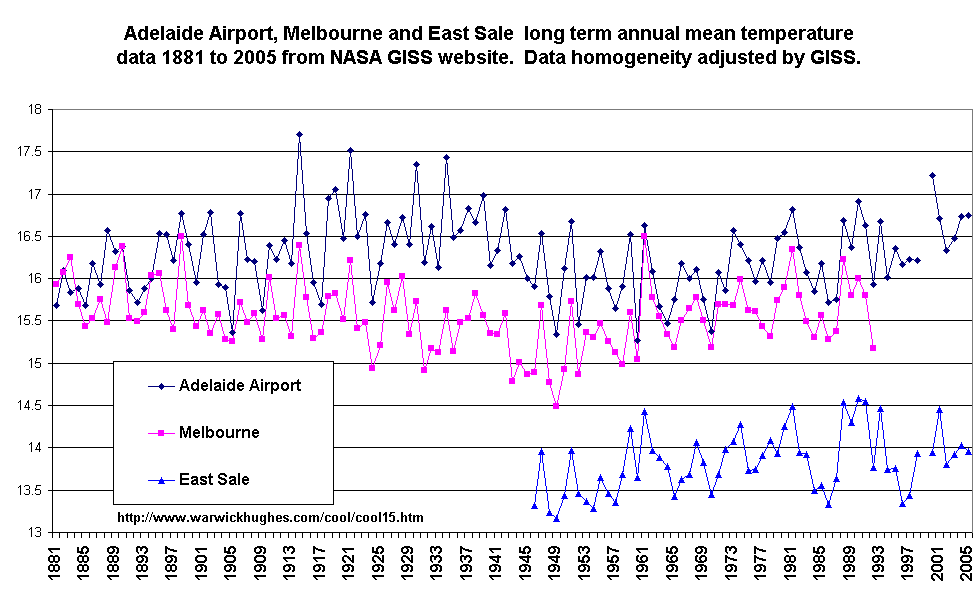
Adelaide has known many warmer years
than 2005. Likewise, if the East Sale record was slid up to compare
exactly with Melbourne then it is crystal clear that the BoM will need
a very hot couple of months for their proposal to come to pass in SE
Australia.
Hobart region
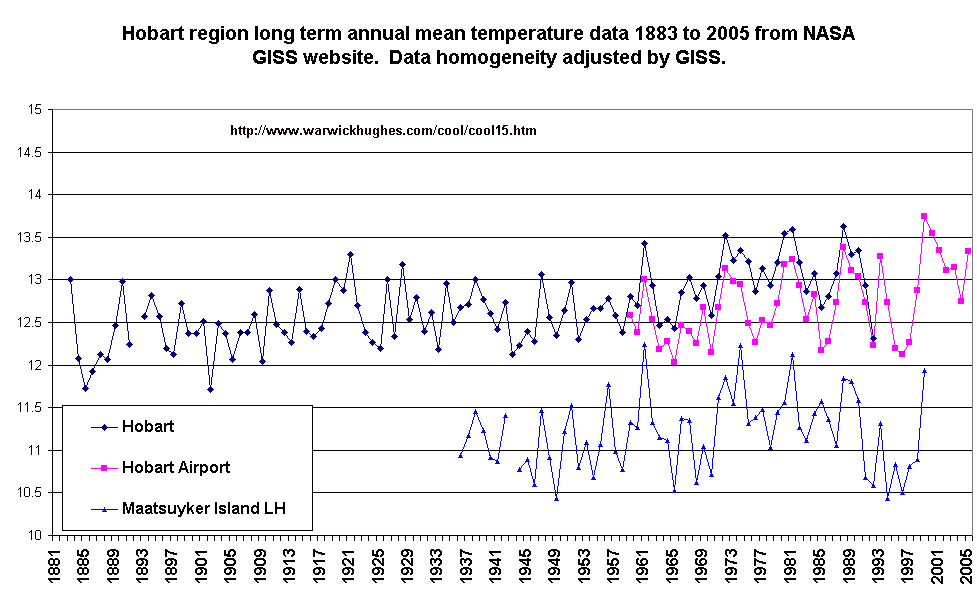
It is obvious that 1999, 2000 and 2001 were warmer than 2005 so the BoM
has no case yet around Hobart that 2005 has been Australia's warmest
year on record. Interesting that Maatsuyker Island Lighthouse is
showing much less warming than Hobart Airport so the adjusted GISS data
for Hobart Airport may still carry urban warming, further weakening any
BoM case.
Sydney and Newcastle region
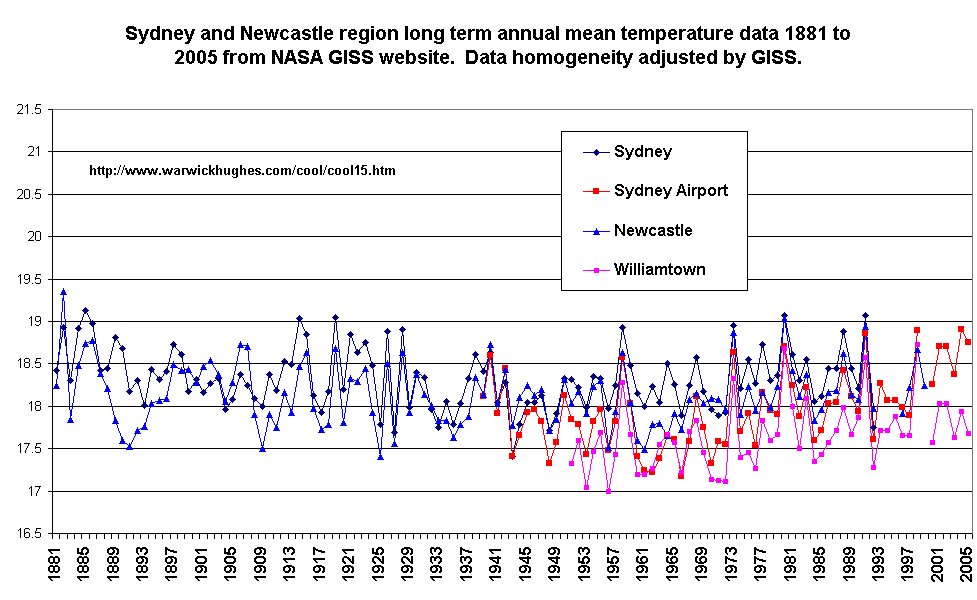
The best guide here is to see where 2005 at Williamtown relates to the
Newcastle century long data, which is from Nobbies Signal Station and
it is obvious that there is no possibility in Sydney and Newcastle that
2005 has been Australia's warmest year on record. It is equally
obvious that the Sydney Airport data, affected as it is by a strong
“urban heat island” (UHI) effect is artificially warming at a rate much
faster than Williamtown despite any GISS adjustment.
A quick aside here, do not forget that
Sydney Airport is used by the Jones et al team at the University of
Norwich, to compile the “global warming” trends we all know so
well. For my “20th Anniversary Review” of the unsound Jones et al
1986 methodologies, see;
http://www.warwickhughes.com/cru86/
Moving north to Brisbane and
it is obvious in this region that if the Eagle farm data was “merged”
with the old Brisbane Regional Office trend then there is no chance
that 2005 has been Australia's warmest year on record.
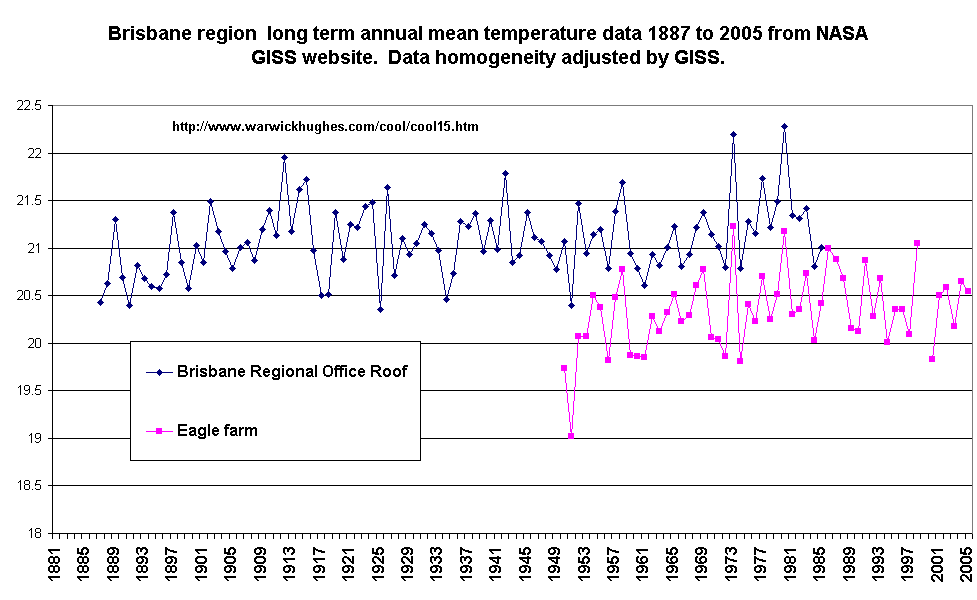
At this point we have to ask ourselves, “where in Australia is this
unprecedented warming the BoM talking about ?”
Checking the circa 125 years of data from Darwin
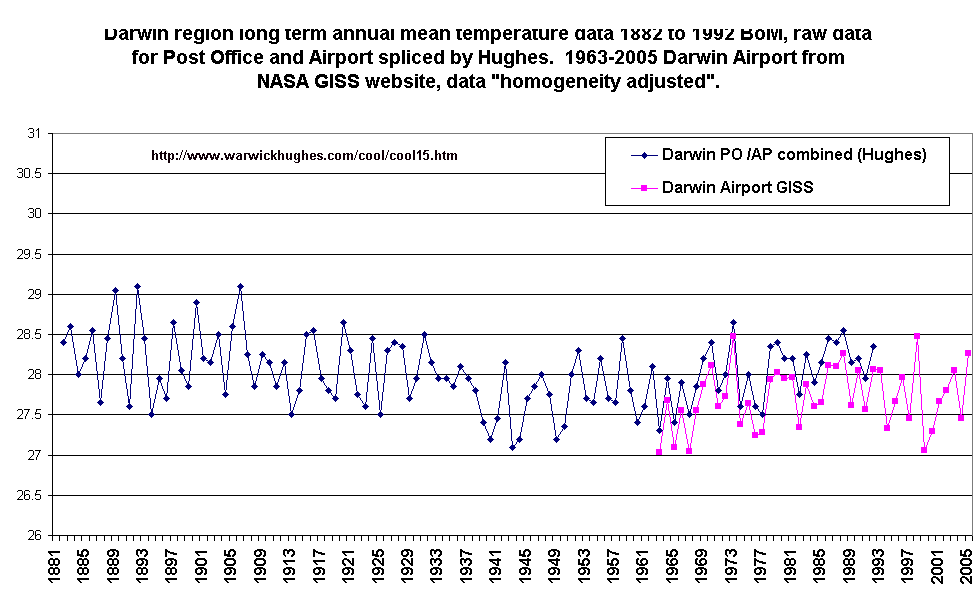
It is obvious that 2005 is a warm year but it was topped by 1998, might
equal 1988 and will be topped easily by 1973. It is also obvious
that if the Airport data are merged with the earlier Post Office data
then several years 1906 and earlier would have been warmer than
2005. Hence in this area the BoM claim that 2005 has been
Australia's warmest year on record, is not borne out by the data.
The GISS team do provide on their web page a full Darwin record
splicing the Post Office and Airport but in my opinion it is not one of
their better efforts and I prefer my own splice. If anyone prefers the
GISS Darwin from 1882 then it makes no difference to the above yearly
comparisons.
Moving now to Central Australia,
that of the circa 125 year long Alice
Springs temperature record. In this case, GISS do not
provide a circa 125 year long record in their “homogeneity adjusted”
data, but if readers make a graph for Alice Springs from the GISS
Dataset listed in their “pull down menu” as “after combining sources at
same location”, then you will see a graphic very similar to mine
below showing that almost a dozen years have been warmer than 2005.
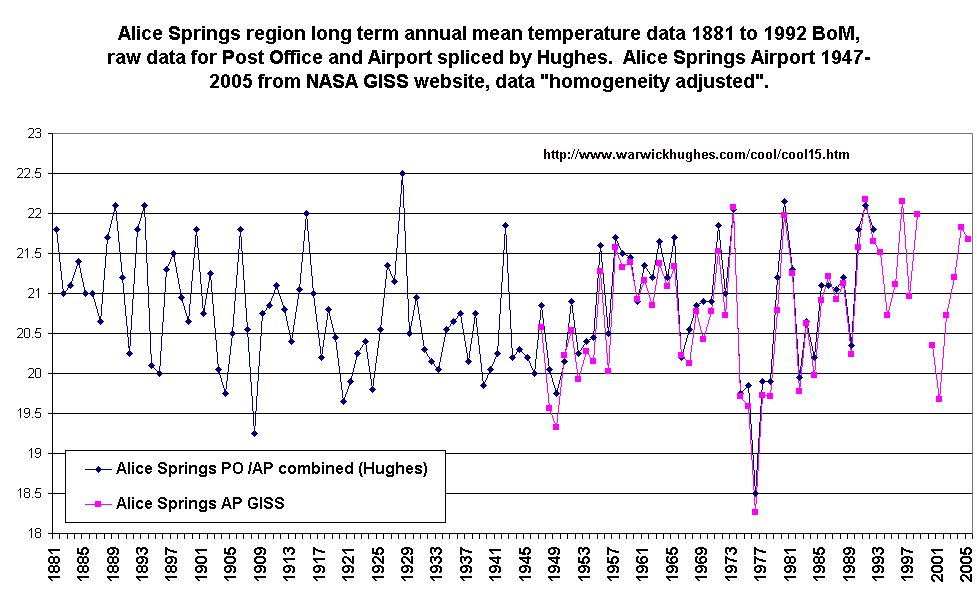
So it seems doubtful that Alice Springs data will provide confirmation
for the BoM that “2005 has been Australia's warmest year on record” but
the data at years end will tell.
It is interesting that the BoM risks its prestige with dubious
statements re the warmth in 2005 exactly at the time that the UK and
Europe are backing away from the Kyoto Protocol and the Australian
stance not to ratify Kyoto looks better with every day.
Last graphic from NE Queensland
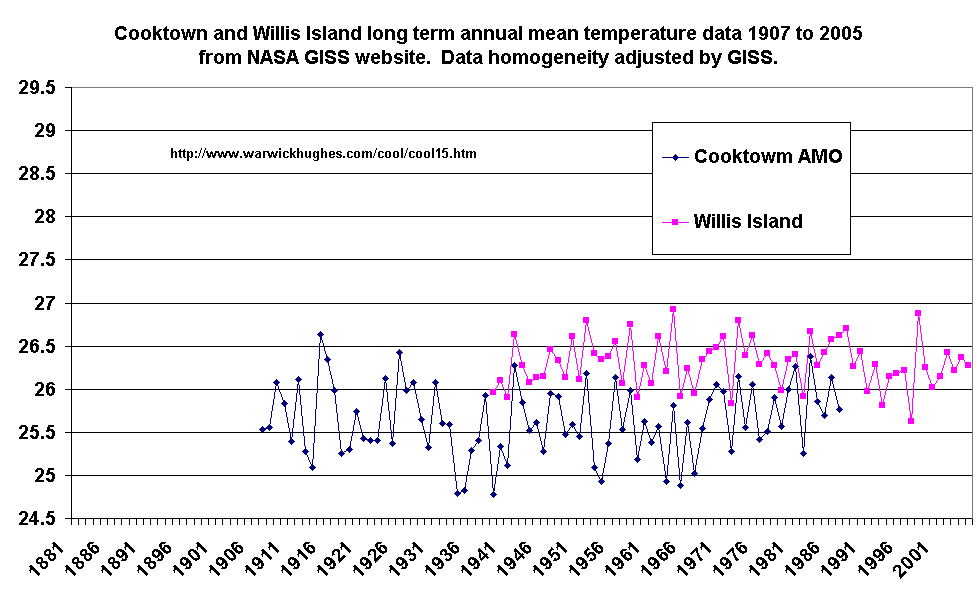
A side issue here raised on Jennifer Marohasy's Blog, almost 100 years
of rainfall history for the Cairn's
district.
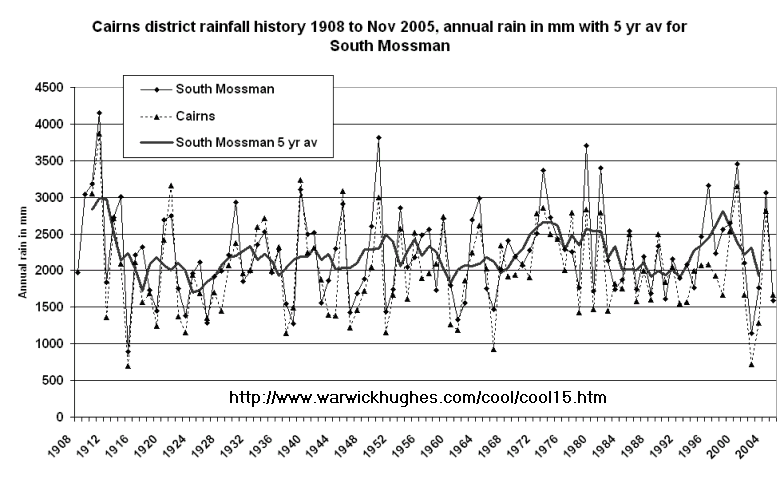
Nothing abnormal about recent times.
Look how the BoM risks its prestige every month with implausible media
releases puffing claims about its 3 month “Outlook” model forecasts,
many of which turn out to be wrong. For my critique of BoM
rainfall “Outlooks” see;
http://www.warwickhughes.com/drought/
Temperature Outlook critiques for 2005 are at;
http://www.warwickhughes.com/cool/cool14.htm
Pre 2005 temperature Outlook critiques are at;
http://www.warwickhughes.com/climate/cool8.htm
What a waste of taxpayers money these Outlooks are !!!
When will this waste be stopped ?
Would anyone at this point back the BoM’s view of the relative warmth
of 2005 over that of NASA ?
You read it first here.
 "Remembering
Rain" ABC TV documentary 9:25pm Thursday,
November 10, 2005
"Remembering
Rain" ABC TV documentary 9:25pm Thursday,
November 10, 2005
The show was a
showcase for rural personalities and made a great case for more
dentists in the bush. But why does the ABC have to
ruin a good documentary with exaggerations about the basic premise ?
The ABC summary ex their website is pasted below and starts off, "In the face of the
worst drought on record,...". That hoary old chestnut
again. Based on interviews with property owners in various
directions surrounding Condobolin in central New South Wales, the show
could better have been named,
"Forgetting Rain".
As the Condobolin
rainfall history shows there is nothing unique about recent
years. The high rainfall years post the 1940's correspond
with a period of cloud seeding experiments in NSW from post WWII to
1974. With cloud seeding "on the nose" due to Green opposition it
is thus possible that high rainfall yearsover 650 mm may be
rare in the future.
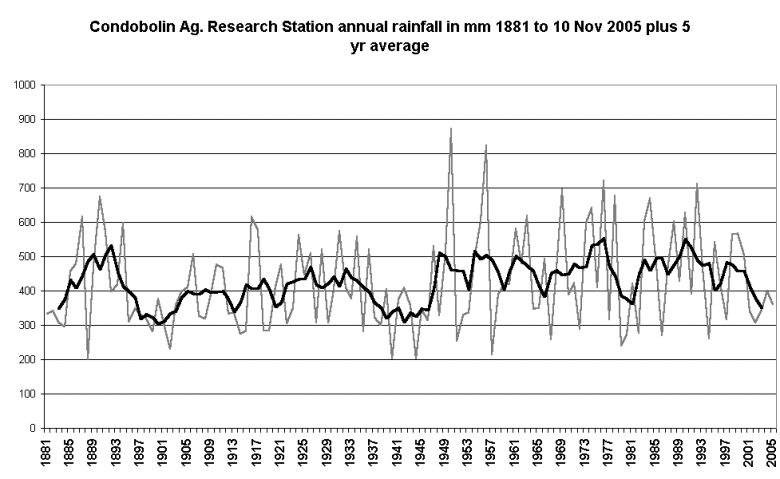
Remembering Rain Text off ABC
webpage
http://www.abc.net.au/tv/guide/netw/200511/programs/ZY7779A001D10112005T212500.htm
In the face of the worst drought on record, rural Australians have
gambled their dreams on the chance of rain - and cracks are starting to
show in more than just the parched earth.
Remembering Rain introduces us to the people of the bush and offers us
a glimpse into their lives, their hopes and their fears as they attempt
to weather the crisis.
These are tough times for families on the land. Prices are low,
expenses high. After more than three years without useful rain, many
are deep in debt and considering cutting their losses and selling up.
But who would want to buy in this climate? And what is happening to the
communities left behind? Could this be the end of an era?
It's a predicament that many are facing with wry humour, pragmatism,
even stubborn optimism. The survivors are fighting to stay on the land
they love, but there are difficult decisions to be made.
Back to Coolwire Index
Back to www.warwickhughes.com










 "Remembering
Rain" ABC TV documentary 9:25pm Thursday,
November 10, 2005
"Remembering
Rain" ABC TV documentary 9:25pm Thursday,
November 10, 2005